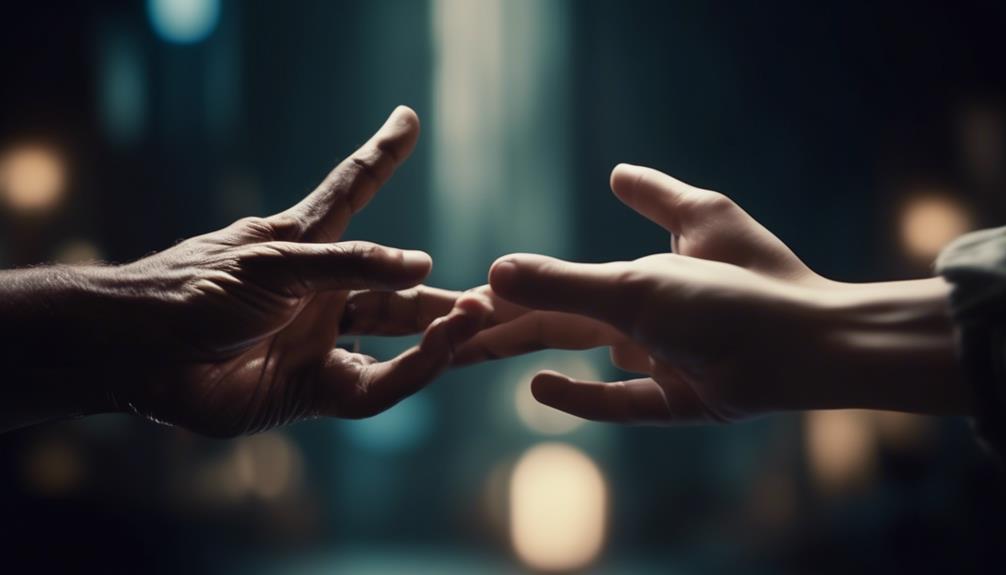How Long to Wait Before Repairing a Broken Friendship

There is no set timeframe for repairing a broken friendship, as it depends on the specific circumstances and dynamics involved.
It's important to consider the reasons for the break, the length of the friendship, and the impact it had on both parties before deciding when to take steps towards repairing it.
Key Takeaways
- Reflect on the events and circumstances that led to the breakdown to understand the root cause and address underlying issues.
- Assess the impact of the break on both parties' emotions and well-being, considering the emotional consequences of losing a friend.
- Evaluate the significance of the friendship's history and shared understanding, as well as the dynamics and challenges influenced by the duration of the friendship.
- Seek support from trusted friends or a therapist to navigate the emotional challenges and seek guidance and perspective in repairing the friendship.
Assess the Reasons for the Break
First, take a moment to reflect on the reasons behind the break in your friendship. It's crucial to understand why the relationship suffered a fracture before considering reconciliation. This introspection will enable you to gain insight into what caused the break and help you navigate the healing process more effectively.
To begin, consider the events or circumstances that led to the breakdown. Was it a disagreement, a betrayal, or simply growing apart? Understanding the root cause will allow you to address the underlying issues and prevent similar conflicts in the future.
Next, examine your own role in the break. Were there any actions or behaviors on your part that contributed to the rift? It's important to take responsibility for your actions and acknowledge any mistakes you may have made. This self-reflection won't only help you grow as an individual but also demonstrate sincerity and maturity to your friend.
Furthermore, consider the impact the break has had on both parties. How has it affected your emotions, well-being, and overall sense of happiness? Understanding the consequences can motivate you to actively engage in the healing process and work towards repairing the friendship.
Consider the Length of the Friendship
When repairing a broken friendship, it's important to consider the length of the friendship and the significance of the history you share. A long-standing friendship carries with it a depth of experiences, memories, and shared understanding that can make it worth salvaging.
Reflect on the time you've spent together, the milestones you've celebrated, and the challenges you've overcome, as you contemplate whether the friendship is worth repairing.
Duration of Friendship
The length of a friendship plays a significant role in the dynamics and challenges that may arise when repairing a broken bond. The duration of a friendship affects the level of emotional investment, shared experiences, and mutual understanding between friends.
When assessing the duration of a friendship, it's important to consider the significance it holds in your life. A long-standing friendship may have a deeper emotional impact, making it worth the effort to repair. On the other hand, a shorter friendship may require a different approach to rebuilding trust and connection.
Regardless of the duration, it's important to approach the repair process with empathy, insight, and practicality. By acknowledging the unique dynamics influenced by the duration of your friendship, you can navigate the challenges and work towards a stronger bond.
Importance of History
Consider the depth of your shared experiences and the emotional connection you have built over time as you reflect on the importance of history in repairing a broken friendship.
Your history together is like a tapestry, woven with trust, laughter, and vulnerability. It's this history that gives your friendship its unique character and makes it worth fighting for.
When a friendship is broken, it's crucial to rebuild the connections that were once so strong. Trust becomes the foundation upon which you can rebuild. It requires open communication, honesty, and a willingness to understand and forgive.
Reflect on the memories you've created together, the challenges you've overcome, and the growth you've experienced. Let these reminders of your shared history guide you as you embark on the journey of repairing your broken friendship.
Evaluate the Impact of the Broken Friendship
Now that you've had time to reflect on the length of your friendship, it's important to evaluate the impact that the broken friendship has had on you.
The emotional consequences of losing a friend can be significant, causing feelings of sadness, anger, or even betrayal.
Take a moment to assess the dynamics of your relationship and consider how they may have contributed to the breakdown.
Understanding the impact and acknowledging your emotions will help you navigate the path to repairing your friendship.
Friendship's Emotional Consequences
Experiencing a broken friendship can leave you feeling a complex mix of emotions that can have a significant impact on your well-being. The emotional consequences can be overwhelming, and it's important to acknowledge and address these feelings in order to move forward.
It's normal to feel hurt, betrayed, or even angry after a friendship is broken. Trust, which is the foundation of any relationship, has been shattered, and rebuilding it can take time and effort.
Healing from a broken friendship involves a process of understanding and forgiveness. It requires open communication, empathy, and a willingness to work through the issues that led to the breakdown.
Remember that healing is a personal journey, and it's okay to seek support from trusted friends or even a therapist to help navigate through the emotional challenges.
Assessing Relationship Dynamics
As you navigate the aftermath of a broken friendship, it is important to take a step back and assess the dynamics of the relationship, understanding the impact it has had on both parties involved. Evaluating the relationship dynamics will help you gain insight into what went wrong and how to address it. Rebuilding trust is a crucial component of repairing a broken friendship, and to do so, you need to identify the underlying issues that led to the fracture. Consider the following table to better understand the impact of the broken friendship:
| Relationship Dynamics | Impact on You | Impact on the Other Person |
|---|---|---|
| Lack of communication | Hurt and confusion | Feeling ignored or unimportant |
| Betrayal of trust | Anger and disappointment | Guilt and regret |
| Differences in values or priorities | Frustration and resentment | Feeling misunderstood or judged |
Reflect on Personal Growth and Change
Reflecting on your personal growth and the changes you have experienced can be a valuable step towards repairing a broken friendship. Personal transformation is a powerful tool to bring about positive change in your relationships. Take the time to engage in self-reflection and understand how you have evolved as a person. This introspection won't only help you gain deeper insights into yourself but also enable you to approach the broken friendship with a fresh perspective.
Self-reflection allows you to evaluate your actions, attitudes, and beliefs, and identify areas where you may have contributed to the breakdown of the friendship. It's an opportunity to recognize any negative patterns or behaviors that may have impacted your interactions. By acknowledging these aspects, you can work towards personal growth and make the necessary changes to prevent similar issues from arising in the future.
Innovation in repairing broken friendships lies in your ability to adapt and grow as an individual. Embrace the opportunity to learn from past mistakes, develop new skills, and adopt a more mindful approach to your relationships. By demonstrating personal growth and change, you show your friend that you're committed to repairing the friendship and willing to make amends.
Gauge the Other Person's Willingness to Reconnect
To repair a broken friendship, it's important to assess whether the other person is open to reconnecting with you. Assessing their willingness to reconnect requires careful observation and open communication. Start by evaluating their communication patterns. Are they responding positively when you reach out? Do they seem interested in maintaining contact? Pay attention to their nonverbal cues as well, such as body language and tone of voice. These can provide valuable insights into their true feelings.
Rebuilding trust is also crucial in assessing their willingness to reconnect. Trust is the foundation of any relationship, and when it has been broken, it takes time and effort to repair. Look for signs that they're willing to work on rebuilding trust with you. Are they willing to listen and understand your perspective? Do they take responsibility for their actions and express remorse? These are positive indications that they're open to reconnecting.
Analyze the Importance of the Friendship
Consider the significance of your friendship and its impact on your life. A broken friendship can leave a void that's hard to fill. Before deciding whether to repair it, take a moment to reflect on the importance of this relationship. Here are three aspects to consider:
- Importance of communication: Think about how your friendship has been built on open and honest communication. Has this person been a confidant, someone you can share your joys and sorrows with? Has their presence been a source of comfort and support in your life? Reflect on how valuable this level of communication has been to you.
- Rebuilding trust: Trust is the foundation of any relationship. Assess whether this friendship has had a strong foundation of trust in the past. Evaluate if the broken trust can be repaired and if both parties are willing to put in the effort to rebuild it. Trusting someone again requires vulnerability and forgiveness, but it can lead to a stronger bond if both parties are committed to the process.
- Impact on your life: Consider the impact this friendship has had on your overall well-being. Have they been a positive influence, encouraging you to grow and achieve your goals? Have they contributed to your happiness and personal development? Reflecting on the positive impact this friendship has had on your life can help you determine if it's worth repairing.
Analyzing the importance of your friendship can provide valuable insights into whether it's worth repairing. Take the time to reflect on these aspects and make a decision that aligns with your values and desires for growth and innovation. Remember, repairing a broken friendship requires effort from both parties and a willingness to communicate and rebuild trust.
Seek Support From Mutual Friends or a Therapist
If you find yourself grappling with the decision of whether or not to repair your broken friendship, seeking support from mutual friends or a therapist can provide valuable guidance and perspective.
Sometimes, the path to healing a fractured friendship can feel overwhelming or uncertain, and that's where seeking professional help can make all the difference.
Mutual friends can serve as a bridge between you and your estranged friend. They may offer insights into the situation that you hadn't considered or provide a fresh perspective on how to move forward.
By sharing their own experiences and observations, they can help you find common ground and facilitate open and honest communication.
A therapist, on the other hand, can offer an objective viewpoint and provide you with tools to navigate the complexities of repairing a friendship. They can help you explore your feelings, identify any underlying issues, and develop strategies for effective communication and conflict resolution.
Their expertise and guidance can empower you to make informed decisions about the future of your friendship.
Trust Your Gut Instincts and Intuition
Listen to your intuition and trust your gut instincts when it comes to repairing a broken friendship. Your gut instincts are a powerful tool that can guide you in making decisions about your relationships. Here are three reasons why you should trust your gut instincts and intuition:
- Personal Judgement: Your gut instincts are based on your personal experiences and knowledge. They're a reflection of your subconscious mind processing information that you may not be consciously aware of. Trusting your gut means trusting yourself and your ability to make sound judgments about the situation.
- Emotional Intelligence: Your gut instincts are closely tied to your emotions. They can provide you with valuable insights into how you feel about the friendship and whether it's worth repairing. Pay attention to any feelings of discomfort or unease, as they may indicate that the friendship is no longer healthy or beneficial for you.
- Intuition: Intuition is often described as a 'gut feeling' or a 'knowing without knowing why.' It's a powerful force that can help you navigate complex situations. Trusting your intuition means tapping into your inner wisdom and allowing it to guide you towards the right course of action.
Frequently Asked Questions
How Can I Rebuild Trust in a Broken Friendship?
Rebuilding trust in a broken friendship takes time and effort. Start by repairing communication and showing empathy. Address the issues that led to the broken trust, and work towards understanding and forgiveness.
Should I Reach Out to the Person Who Ended the Friendship or Wait for Them to Make the First Move?
If your friendship is important to you, don't wait for them to make the first move. Self-reflect, then take the initiative. Initiating the conversation can lead to potential benefits in repairing the broken friendship.
Is It Possible to Repair a Broken Friendship if the Other Person Has Moved on and Made New Friends?
Is it too late to rebuild a broken friendship when the other person has moved on and made new friends? Don't wait for the perfect timing. Reach out with genuine empathy, show understanding for their new connections, and create innovative opportunities for reconnection.
How Can I Determine if the Friendship Is Worth Repairing?
To determine if a friendship is worth saving, reflect on the joy it once brought you. Look for signs of irreparable damage, like constant disrespect or lack of trust. Trust your intuition; it knows what's best for you.
Are There Any Warning Signs That Indicate a Broken Friendship Is Beyond Repair?
Can therapy help repair a broken friendship? It depends on the individuals involved and their willingness to work through their issues. Establishing healthy boundaries is crucial in a repaired friendship, ensuring both parties feel respected and valued.











